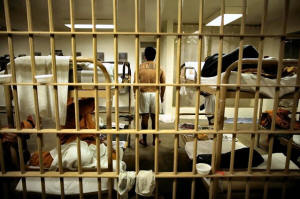|
 Sentencing
reform could help U.S. economy: White House panel Sentencing
reform could help U.S. economy: White House panel
 Send a link to a friend
Send a link to a friend
[April 26, 2016]
By Julia Harte
WASHINGTON (Reuters) - Overcrowded prisons
strain state budgets, take people out of the work force and pull
families apart more than they reduce crime or boost the U.S. economy,
said an Obama administration study discussed on Monday by experts at the
White House.
|
|
 The study, undertaken as part of President Barack Obama's efforts
to reform the criminal justice system before he leaves office, was
conducted by the White House Council of Economic Advisers and
focused on the costs of sentencing and incarceration policies. The study, undertaken as part of President Barack Obama's efforts
to reform the criminal justice system before he leaves office, was
conducted by the White House Council of Economic Advisers and
focused on the costs of sentencing and incarceration policies.
Despite falling crime rates, U.S. prison populations have soared in
recent decades as a result of harsher federal and state-level
sentencing policies, such as "three strikes" rules under which
offenders much be imprisoned on their third conviction.
Both conservative and liberal panelists discussing the report on
Monday agreed that lighter sentences for non-violent offenders and
lower barriers to job opportunities after prison would address the
economic problems described in the report.
 "This isn't really about the money. This is about the lives that
we're throwing away," said Arthur Brooks, president of the American
Enterprise Institute, a conservative think tank that co-hosted the
event with the liberal Brennan Center for Justice of New York
University.
Obama's push for criminal justice reform has support from both ends
of the political spectrum, with bipartisan legislation pending in
Congress that would reduce mandatory minimum sentences for some
low-level federal drug crimes.
Those proposed reforms are backed by a Brennan Center-affiliated
coalition of local law enforcement officers around the country, who
agree that the default response to non-violent crimes should not be
prison time, said the center's director of justice programs, Inimai
Chettiar. Panelists said the study showed that some existing
criminal justice policies are counter-productive. In the arena, "far
too little of what we do actually makes sense or is backed by
specific evidence," said Peter Orszag, who led the Congressional
Budget Office in 2007 and 2008.
[to top of second column] |

There are 2.2 million Americans behind bars, a prison rate that is
more than four times the world average.
The Justice Department said on Monday it will expand federal
programs that ensure ex-prisoners have the skills needed to find
work, and that they also have access to housing, education and
financial credit after release.
Every federal inmate should get an individualized re-entry plan
"tailored to his or her risk of recidivism and ... needs," said a
Justice Department press release.
U.S. Attorneys and the Bureau of Prisons are hosting more than 570
events nationwide this week on re-entry initiatives.
(Editing by Kevin Drawbaugh and Frances Kerry)
[© 2016 Thomson Reuters. All rights
reserved.]
Copyright 2016 Reuters. All rights reserved. This material may not be published,
broadcast, rewritten or redistributed.

 |